15.10.2004
А.Kentler. Break-through to the future.
The event that took place on the 7-8 of October both in Moscow and St.Petersburg could have gone unnoticed: there were only four children in both cities came to play chess. It's not a big deal! They played blitz – frankly speaking not the most serious chess. Children were sat in front of plasma panel instead of chess pieces and were given mice; however that is not surprising in the computers age…
Nowadays the number of noteworthy chess competitions constantly decreases, as a result, life of chess professionals becomes more difficult. They have to content themselves with open tournaments, the probability to win prizes in which associates with the song "Fifteen man at a chest of a corpse". This can be exemplified by deathly silence of sponsors in response to the appeal for money for tournaments. Let those who consider that I exaggerate the situation, think over the question: will it be easy for example to find funds for the unifying match Kasimdzhanov – Leko? And now after you have laughed I'll note that, judging from the results of G.Kasparov in Turkey and V.Kramnik in Switzerland, anything may happen.
Playing in electronic space becomes more widespread because of reduction of playing face to face. Moreover FIDE has already organized a few knock-out elimination matches for world championship for amateurs, who played in Internet. Theirresultscan'tbecalledotherwisethanscandalous. The jury, having analyzed the games, disqualified the simpletons who repeated the best moves that were appearing at available for them equipment such as supplementary computers, which were analyzing the games, and adjudged the wins only to the subtle knaves who were either making third in order moves that were given by a computer or followed personal advice of the best grand masters of the world. Some "grands" got pleasure from the easiness of mockery at the entire chess world: instead of elite chess players that were eliminated some "passer-bys" were taking part in world championships. And in electronic game zones there are fights, in which every honest chess player is only to hope that he is playing with as honest opponent as he is, though unfortunately there is no guarantee by now. Because there is no real control over the players and equipment (they have learnt for example to feign that connection is lost, and during the "malfunction" it's possible to analyze the situation on a chessboard). I can add that only during the open blitz Internet Cup of Russia several players including both winners were disqualified for using some auxiliary.
St.Petersburg company "Intellectual games" deals with all these problems – I recommend everybody who is interested in these problems to read the article of V.Bazhenov "Closed world"at our website in the section "Computer chess". The match St.Petersburg – Paris that was carried out during the celebration of the 300th anniversary of our city was the first step on the way to creation of the protected electronic network between players that can be really controlled. Using the already known technologies a video demonstration of the players was held and there was a control of judges over both playing grounds. The next step was the Children's match that took place at the end of the last week. At that match new information technologies of the company "Intellectual games" were tested with the purpose of realization of the program "Closed world".
Moscow schoolchildren of 10-11 years old from Petrosian's chess club gathered in the office of «EQUANT» on Bolshaya Yakimanka in Moscow and Petersburg schoolchildren came to the Manege where the fifth Russian Venture Fair took place. Many companies wanted to participate in the Fair, but only the best of them were chosen by the strict elimination commission and got the right to demonstrate their stands.
The strict jury, half of whom came from abroad, chose five best companies in each of six fields: the best company, the best marketing, the best management, the best presentation, for success in Russian market, for success in international market. I just want to note that "Intellectual games" was chosen as the company that made the best presentation. It's not surprising: against a background of stand-offish investment projects our project stood out by the continuous videoconference with Moscow, by uninterrupted movement of pieces at the demonstrative board and (which is the main thing) by nice shining faces of children on each side of the screen. That's why not only VIP guests approached our stand (the plenipotentiary of the President of Russia in the North-West Region I.Klebanov lingered on for about ten minutes in front of our stand), but also everyone who is interested in the process of "transmission of thoughts over a distance".
It should be noted that the partners were chosen not arbitrarily: we have been collaborating with the director of Petrosian's chess club GM S.Smagin from the time of the "Match of generations. And there is no better executor of the ideas which deal with the development of children's chess than L.Belavenets. The first lady of children's chess in Petersburg is G.Neizberg, who got the better of all the important men involved in sports life long ago – her Children's chess centre of Kirovsky district has the best results in the city. The number of children, their age and time control were agreed straight away. From the point of view of the control over the equipment 5 minutes blitz games were the ideal ones. Children played according to Schveningen – each child from Moscow played two games with each citizen of St.Petersburg (with White and Black pieces) and during two days we were eye-witnesses of 32 games. It should be added that for the testing of the equipment and from curiosity a few games were played between S.Smagin and M.Taimanov. Both children and grand masters could see each other constantly, the time control was the same as during usual blitz games. The "EQUANT" company provided a connection channel especially for the event.
Certainly both before and after the competition the authors of the project had been constantly testing the equipment, they've discovered new fields of work. But the main conclusion is not the result of the match, but the confidence that tomorrow is with creation of branchy impenetrable system of stationary chess places. Because it's not a secret that only a few men have possibility to travel from continent to continent, from country to country from one chess competition to another. And to come to the nearest chess club and to play with the opponent who is at the distance of thousand kilometers away and watch him constantly having an impression of presence, this is not simply the way out, it's great!
Now a few words about the match. Both teams consisted of the champions and prize-winners of the championships of Russia and cities of small ages.
There was a stubborn struggle in the first circle. After the first three rounds Moscow players were the leaders, and only at the end of the first day St.Petersburg players, who had White, were ahead by two points – 9:7. And on the second day there wasn't any struggle, the match resulted in a great win of the provincial team.
Among St.Petersburg players A.Smirnov (7 of 8) and D.Bazhenova (6 points) had the best results. In Moscow team the best result among the boys had D.Dolbnya (3,5), and among girls D.Pustovoitova (3).
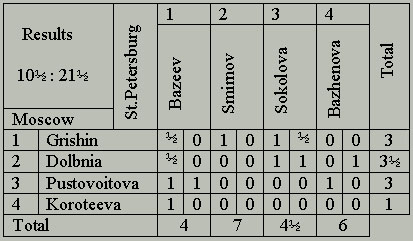
The players of both cities were awarded two-volume books by V.Korchnoi. The participation of the Minister of Education and Science of Russia A.Fursenko made the ceremony of awarding even more solemn. After his address to the participants (everything that was going on in Petersburg was seen in real time by those who were present in Moscow club) a famous radio commentator of "Majak" Y.Damsky asked a pointed question, whether Andrej Andreevich considers introduction of chess lessons to the programs of the primary school in Russia to be possible. The Minister was not at a loss of words and answered that he treated with respect chess and chess players, especially since he knew how the vice- premier A.Zhukov was taking care of them. "As everybody knows the program of the primary school is surcharged and if you can point out the subject that can be abolished and instead of which chess can be introduced than we can consider this question". Then Fursenko mentioned that chess is not the only subject, which devotees were trying to introduce into the school program. But he would be a bad Minister if he promised anybody to contribute to introduction of any subject instead of traditional ones.
In conclusion the Minister was photographed with the children and wished them success in study and chess.
The video blitz tournament that was held on the 7-8 of October gives hope that with use of new technologies chess won't be in the bondage of a purse. New horizons of meetings with equal in strength opponents regardless of their remoteness are being opened. The future opens today.
The photo-report of the video blitz match between children`s teams of Moscow and St.Petersburg.
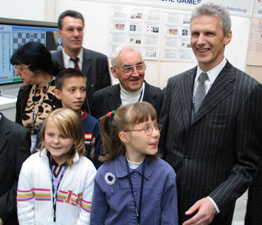
The Minister of Education and Science of Russia A.Fursenko at the closing of the match.
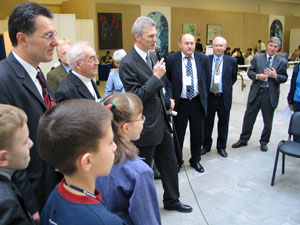
A.Fursenko greets the Moscow players.
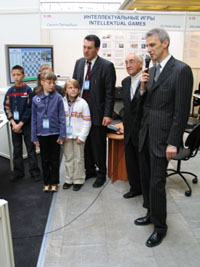
Answer to the question from Moscow.
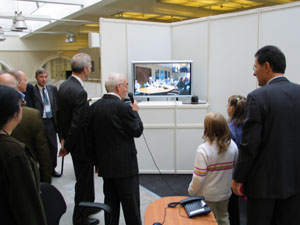
All Moscow players on the plasma panel.
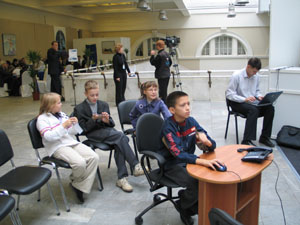
The team of St.Petersburg. G.Bazeev is playing.
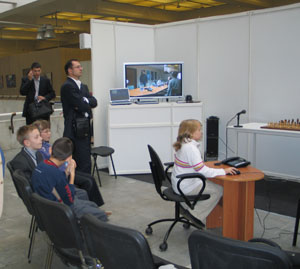
V.Sokolova is playing.
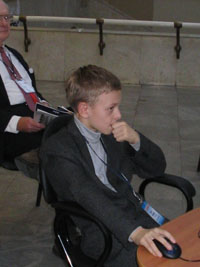
A.Smirnov had the best result (7 of 8).
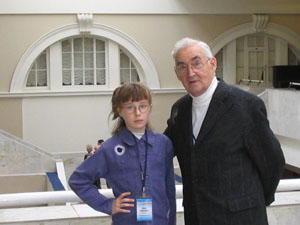
D.Bazhenova, who had the best result among girls (6 points), with GM M.Taimanov.
